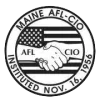Workers Support Bills to Fix Maine’s Workers’ Compensation System
The Legislature’s Labor and Housing Committee will hear a number of bills on Monday, March 4th and Wednesday, March 6th to fix Maine’s workers’ compensation system. The Committee meets in room 202 of the Cross State Office Building.
Maine’s workers’ compensation laws have been weakened over recent years as the workers benefits side has been systematically chipped away in favor of employers. This session we hope to fix some of the bad changes that have been made over the past decade. The deck is stacked against injured workers in both small and big ways, and we want to restore the system so that it works for workers who are hurt on the job.
Please consider coming to Augusta to testify on either March 4th or March 6th. If you know anyone who has been impacted by any of the specific issues in these bills, please let us know and we can work with you to have them testify. Direct stories are very helpful. These two days of hearings will not encompass all of the Workers’ Comp related bills for 2019, so there will be future public hearings this session on other workers’ comp bills, including an important bill to repeal the cap on long term partial benefits. This cap was enacted under Gov. Paul LePage, and the bill to repeal it will be one of the bigger comp. fights this year. We will post an update as soon as the hearings on those additional bills are scheduled.
Monday, March 4th at 8 am
LD 601: An Act to Create Fairness in Weekly Workers’ Compensation Benefits
Position: SUPPORT
The early 1990s Workers Compensation law changes removed Cost of Living Adjustment (COLA) annual increases from weekly benefits. For workers receiving benefits for multiple years, this seriously impairs their purchasing power – and with no policy justification. Currently you get the same rate of benefits in year 1 as year 3, 4, 5, etc.. and your buying power goes down every year. This bill would restore the COLA for weekly benefits.
LD 600: An Act to Achieve Mental Health Parity in Workers’ Compensation
Position: SUPPORT
LD 600 would improve Maine’s Workers’ Compensation laws by changing the standard of proof required to demonstrate entitlement to compensation for a mental injury caused by stress so that it is the same standard as is required with respect to physical injuries. This bill is important to first responders and other workers who are impacted by post- traumatic stress injuries.
Wednesday, March 6th at 10 am
LD 947: An Act to Extend the Notice of Injury Period in the Maine Workers’ Compensation Act of 1992
Position: SUPPORT
In 2011, the notice period to report an injury to the employer was cut from 90 days to 30 days. This means that workers only have a short window of time to notify their employers of an injury before their chance to have a claim is completely shut off. This bill would extend the notice period from 30 days to 180 days.
LD 901: An Act to Clarify the Statute of Limitations under the Workers’ Compensation Act
Position: SUPPORT
Prior to 2011, an injured worker had two years to file a claim from either the date of the injury or from the date the employer filed the First Report of Injury (FROI) – whichever date was later. In practice this matters in cases where the employee does not lose time from work until well after the date of the injury (like when the injury is gradual in nature). This changed under Gov. LePage, however, and now the two-year statute of limitations can start without the filing of a First Report of Injury. The practical impact is that the two years can run out on a worker and the worker might never have been notified of his/her rights. This bill reverts to the way it was before 2011.
LD 758: An Act to Clarify Work Search Requirements for Workers’ Compensation
Position: SUPPORT
Currently, if an employer wants an injured worker who is out on comp to take a different job, the burden is on the worker to find a job they can do despite their injuries. This bill would shift that burden to be on the employer to identify actual available jobs. This would significantly streamline the work search process and reduce litigation.
Please consider coming out in support of these important bills!
